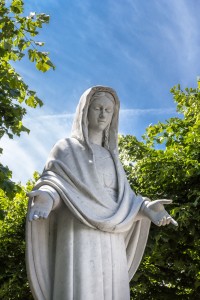
Many different faiths allow women to serve as ministers and leaders, but the Catholic Church has lagged behind. For generations, only men have been ordained as deacons and priests. While nuns do have a valuable place in the church, they certainly don’t have the leadership roles that other individuals might. A few months earlier this year, Pope Francis mentioned that he wanted to see more women in decision-making roles. He is taking action by creating the “Commission for the Study of the Diaconate of Women.” Francis appointed six men and six women to the committee to study whether it is possible for women deacons to serve in the church.
What Is a Deacon?
Within the hierarchy of the church, the deacon is below the priest. Generally, a deacon will be a man who wants to serve God in some capacity but does not wish to be an actual priest. Deacons can actually be ordained if they are married, which is a key difference between priests and deacons. Deacons can serve in many ways. They are ministers of Sacrament, which means they can baptize, witness marriages and conduct funeral services. Normally, a deacon serves in a specific diocese to assist the priest in ministering to the congregation.
In the book of I Timothy, Paul is writing to Timothy about many different matters. In Chapter 3, he discusses the role of deacons in the church. Specifically, deacons must be the husbands of one wife and not a drunkard or greedy individual, and his wife must be also of exemplary character. Many Christians have interpreted this verse to preclude women from serving as deacons. However, Paul also addresses a woman named Phoebe when he writes to the Romans. He calls her “diakonos” in the Greek, which has been translated as servant in this instance. It’s interesting to note that when the word is used in other places in Paul’s writing, it’s translated as minister.
Peter doesn’t discount women when he reminds people of Joel’s prophecy that God “will pour out (his) spirit upon all flesh, and your sons and your daughters will prophesy.” In one of John’s letters, he addresses a “chosen lady,” which in the Greek is the female equivalent of lord. She most likely was a pastor of house-church. Lydia’s house was a sanctuary where Paul and Silas went when they left the jail. Paul lists many women throughout his letters that indicate women were a strong part of the early church.
Members of the Committee
Pope Francis appointed Archbishop Luis Francisco Ladaria Ferrer, who is a Jesuit priest, as the president of the commission. The other members come from around the world, representing Italy, Rwanda, the United States, Germany, Austria, Belgium, Spain and France. Many are professors of theology at prominent universities or serve on other theological committees.
Although the Pope has not actually opened the door for women deacons, he is looking at the issue. He made this comment in an interview, “Because the office for the laity is now being restructured. I am waiting for this to happen and then to take up the second issue, that of the women deacons. Another thing about women theologians: and I would like to stress this—the way women understand, think through and see women’s issues is more important than what women do.”
On one hand, the church teaches that women are equal, but then it forbids women to actually exercise their equality when it comes to the decision-making roles. Pope Francis has the opportunity to make lasting change in the church and incorporate more women into the leadership. It will be interesting to watch what happens with the Commission as it studies the role of women in the early church.

